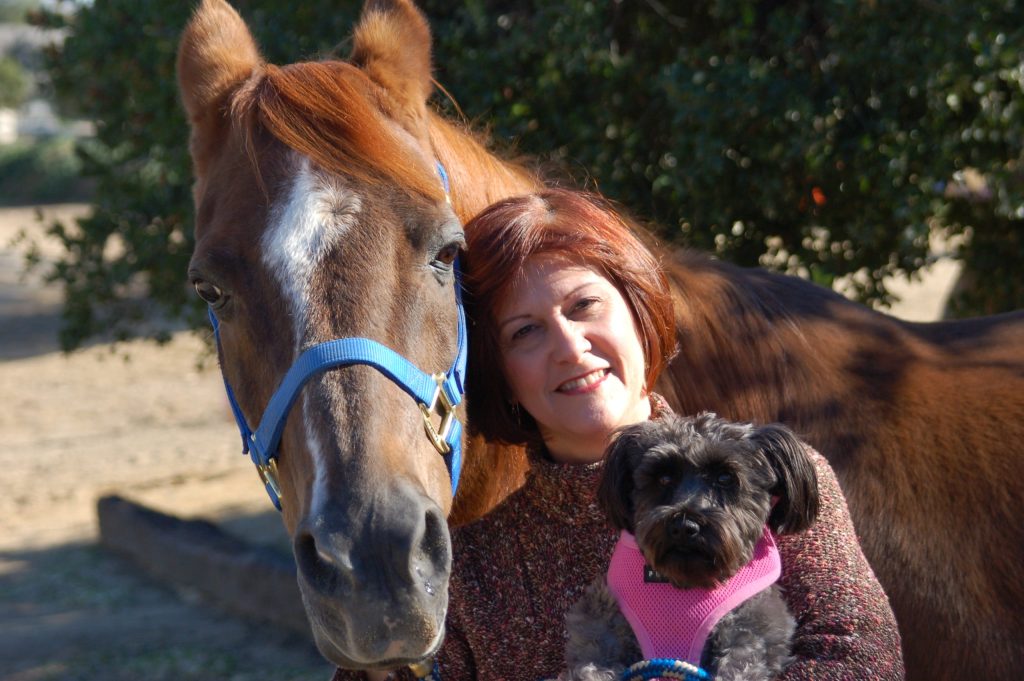Never about Riding. Part 2: Fire
NEVER ABOUT RIDING,
ALWAYS ABOUT THE HORSE
Part 2: Fire Mountain
(This is the second in a four-part series of essays about my horse life, which began when I was fifty years old. Three horses, Fire, Jack, and Luke, have been such an important part of my life that I decided to write them into my novel, Josie and Vic. I wanted to convey the special bond I’ve experienced with each of them, as well as share their distinct personalities. So they became Josie’s beloved horses. After meeting Fire, Jack, and Luke in the novel, my readers can now learn about their real life stories.)
My Life-changing Journey with
Fire Mountain
I quickly learned that owning a horse is an expensive endeavor. Once Fire Mountain was officially mine, I purchased a used saddle, bridle, grooming supplies, halter and lead rope and took over his expenses for board, feed, and vet needs. It wasn’t long before I realized that I had to cut something in my budget—so about two months in, I stopped lessons.
While I certainly had a lot to learn, the truth was Fire was teaching me all I needed to know. We would trot and lope around the arena, meander around the stable property, and occasionally venture out about the neighborhood, partly on bridle paths and partly on the streets. I didn’t realize at the time how bombproof Fire was—he could have been a police horse!—for even if a noisy motorcycle roared by or some rude teenagers would lay on their car horn as they passed, Fire would take it all in stride. I now know that not all horses are like that. (My current horse, Jack, would freak out!) But at the time, I thought this was just how horses were. With Fire, I had no fears.
We were the perfect match. I’d see Fire after work some days, always on the weekends, and daily during vacation time. It got to the point where he recognized my car coming up the drive. Once I parked beside his barn, he’d be nickering as I opened the car door, even before he could actually see me.
What thrilled me beyond words was the instant connection he had with my husband. The very first day they met, Fire rested his head on Bruce’s shoulder and just sighed. Bruce had never been around horses before, yet he too felt immediately at ease with Fire. Apparently, Fire’s first owner was a man who had passed away years before. Since then, Fire had been owned by women, so perhaps Bruce reminded Fire of his first owner. Whatever the reason, they bonded instantly. Bruce soon learned how to halter, groom, and walk Fire, and so began a lifelong love of its own.
As Fire hit his mid-twenties, he began to get progressively lame due to ringbone and advancing arthritis. I eased up on the riding, gradually using only a light-weight soft saddle and just walking around the arena—no trot or lope, no sudden twists or turns. Eventually, when the vet said I might shorten Fire’s life if we continued to ride at all, I stopped altogether. Instead I’d hand walk him, which put me at eye level as we eased along. I’d talk or sing, and he’d bob his head as if nodding in agreement or keeping rhythm. That in itself turned out to be a wonderful experience—and treasured memory.
There is nothing like being in the presence of a horse with whom you have a special bond. No matter what was going on in my life, when I was with Fire, I felt an immediate sense of peace and calm—and he clearly felt this, too. Sometimes—especially in the months and years after my mom passed away—I would just stand beside Fire, my forehead resting on the side of his neck, and he would sigh, then lower and turn his head slightly in my direction, and lean into me. Like a hug. The ache in my heart would ease.
Fire did fairly well until he hit twenty-eight when he began to get progressively lame, sometimes associated with hoof trims. We tried going longer between trims, but his hooves would get too long, so we’d trim and then he’d be lame again. This coincided with my unexpected early retirement from full time teaching that left me with more time to spend with Fire. Unhurried and relaxed, I spent long mornings with him, now focused more on grooming and less on gentle walking. Sometimes I’d just sit in a plastic chair under a tree next to his stall and watch him munch hay and doze.
Around this time, my husband and I decided to move out of Los Angeles to Lake Arrowhead in the San Bernardino Mountains. Initially we planned to keep Fire in Chatsworth where he was comfortable, figuring we’d be driving down often to see family as well. That didn’t work, for the two-hour trip often became three hours or more due to traffic, and in bad weather, heavy fog or snow made the drive down the winding mountain road dangerous. Besides, seeing Fire once a week wasn’t enough. I missed him dearly. So I began searching for a stable closer to our new home.
We decided against bringing him on the mountain because we didn’t want Fire to have to deal with sub-freezing temperatures and snow, as well as the threat of forest fires. After looking at a number of ranches down the mountain, we finally found one that was only a forty-five-minute drive. Surrounded by orange groves and with a stunning view of the mountains, El Camino Ranch in Redlands specialized in breeding and training Arabians; in fact, Fire’s stall would overlook the turn-out pasture for the mares and their foals. Perfect place.
Now my only concern was moving Fire. Could he tolerate the trailer ride? Would the adjustment be too much for him? I had moved him a few years before from Sterling Oaks, when they changed ownership, to a four-horse backyard stable a few blocks away, and he’d barely blinked an eye. Still, this was a bigger move that involved some distance, and he was now twenty-nine, quite old for a horse. So, I consulted his vet, who reassured me that Fire would be fine and not to worry.
In February, we moved him. I remember driving down the mountain in the thickest of fog to get to Chatsworth so I could accompany him. I was terrified because I couldn’t see beyond the hood of my car, but I was determined to be there. Fire was a trouper, as always. Trusting and cooperative, he entered the trailer with no problem. I followed from behind so I could keep an eye on him as we drove two hours across the freeway. When we arrived, Fire was covered in sweat and a bit dazed, but otherwise he seemed okay. No obvious physical distress. I settled him in his new stall with carrots and lots of reassurance.
I hated leaving him that first day, though I knew he was in good hands with the owner Scott and his men, and I had to get back up the mountain before dark. Driving in heavy fog is dangerous, but driving in heavy fog at night is suicidal. The next day I was beside myself because the fog had gotten even worse, and I knew I couldn’t attempt the treacherous drive. Scott reassured me that Fire was fine, had devoured a bran mash, and was settling in, so I had to wait until the next day to see him.
To my dismay, for the first week or so, Fire was dull-eyed and listless. He’d acknowledge me, but no big nicker. Physically he seemed okay. He had an appetite and all systems functioned okay, but clearly, he was depressed—missed his stall mates—his herd—and what he thought of as home. I visited him almost every day and took him out on short walks to get familiar with his new surroundings. When the day finally came that I was greeted with a nicker and a demand for carrots, I shed quiet tears of relief.
Fire became a favorite with the men who cared for the horses there. Antonio picked through the alfalfa, searching for the best batch for Fire; Gregorio put extra shavings in his stall. Often when I walked Fire, I’d be stopped by a trainer or rider who had some advice about supplements for his arthritis or his dry skin. Everyone, it seemed, would pause for a moment when Fire passed by.
Fire’s favorite place was the bullpen, an enclosed cement round pen where horses were trained and lunged. For Fire it was a shaded, quiet place to walk with me or to stop and sniff myriad damp scents left by other horses. One particular summer morning, when we were walking round and round, Fire stopped suddenly, turned his large, soulful eyes to mine, and nickered softly again and again.
“What? What is it?” I asked, wondering if something was wrong. But the sound was tender and gentle, not anxious or plaintive at all. Moved to tears, I hugged him and said in words what I think he was saying to me as well. I love you. You’ve brought so much joy into my life. Thank you. Then we moved on.
One Wednesday, about a week after my fifty-eighth birthday that August, I spent longer than usual at the ranch. During our walk that morning, we passed an arena filled with giggling summer campers, who began singing, “Home, Home on the Range.” Fire stopped abruptly. His ears twisted in their direction as he watched intently, his eyes moving over the chorus of girls. He was clearly captivated. When they finished, he glanced at me as if to say, “Okay, we can go now,” and we walked on.
After our usual routine of grooming and walking, I decided to clean out his grooming box, fill up his bottles of fly spray and skin moisturizer, and organize our little corner of the tack room. Then I brought Fire another handful of carrots and some sweet feed, kissed him on the nose, and said, “See you Friday.” At this point, I was driving down every other day.
I left around 1 p.m. for my drive back up the mountain. At 4:30 p.m., I received a shocking phone call: Fire had been found dead in his stall. I could not comprehend those words. They couldn’t be true. Hysterical, I ran to my husband, and within minutes, we were headed back down the mountain.
Antonio recalled that when he walked by around 4 to get the feed truck loaded, Fire was standing, waiting for his dinner. When he returned to his stall twenty minutes later, Fire was lying lifeless on the ground. It happened that quickly. Earlier that afternoon, Gregorio had checked on Fire to see if he had eaten all of his lunch, as we were trying to put some weight on him. He remembers being pleased and planning to tell me how good Fire’s appetite was. He left for the day, only to get a call a few hours later from one of the other men who said, “Gregorio, your horse is dead.” He knew immediately that he was speaking of his favorite, Fire, for he cared for him as if he were his own.
By all accounts, sometime after 4 p.m., Fire was standing one minute and down the next. It was quick. No prolonged suffering for him, and no agonizing decision to put him down for me—a decision that countless horse owners face. I couldn’t have asked for a better end for Fire. But oh, my heart! I wasn’t ready to say goodbye.
I was grateful that I had been with him that morning and knew he was absolutely fine. If it had happened on a day when I didn’t drive down, I would have wondered if he’d been suffering and ill, and perhaps no one had noticed. But we’d had a great morning together. He wasn’t in any discomfort. He ate his treats with gusto and his lunch, and he was waiting eagerly for dinner. Something happened suddenly. Most likely, his heart failed. A sudden cardiac arrest. A few young women who worked at the ranch lovingly bathed Fire and prepared his body before I came to say goodbye. The owners, Scott, his mother Lavesta, and his daughter Vandi, were there to comfort me and Bruce that painful evening.
Stretched out on the stall floor on a bed of fresh shavings, Fire looked peaceful, but cruelly lifeless. I wept and kissed him, and sobbed and stroked his gorgeous coat. My husband, bless his heart, insisted that Fire be treated with dignity up to the end. His body would not be rendered or tossed aside; he would be cremated and brought to rest with us up on the mountain.
Fire Mountain, my gentle, wise, handsome Arabian horse. He was twenty-nine and a half, yet I thought for certain I’d have him into his thirties. I’d even imagined the pomp and circumstance that would accompany his 30th birthday the next March. He couldn’t be gone.
The first two weeks I was beside myself. I kept closing my eyes and imagining I was brushing his lovely red mane. I thought of that moment in the bull pen over and over again. Did Fire sense something then? Was he offering me the gift of his love—his last words?
As the days passed, I didn’t know what to do with myself. I missed going to the ranch. I missed the smell of horses. I missed feeling close to Fire. So, one day, I drove down to the ranch and offered to groom a few of the older horses.
It wasn’t the same: I was just some lady running a brush over their flanks.
I missed that connection. I missed Fire.
As Scott walked by that day, I pointed to my clean and fully stocked grooming kit and told him how I had filled up all the bottles on the day Fire died. Scott stopped for a moment, then said, “You know what that means, don’t you? You’re not finished yet.”
I knew immediately that he was right. It was then I decided to start looking at horses, just to see how I felt. I couldn’t imagine any other horse in my life. Not after Fire Mountain.

Next: Part 3: Lucky at Blackjack




Beautiful story Debbie- it brought me to tears.
I’m sure you’ve been there. With horses, dogs, cats. They fill our hearts and then leave a hole—but lots of wonderful memories as well.
Sad stories but such beautiful memories. Animals love unconditionally